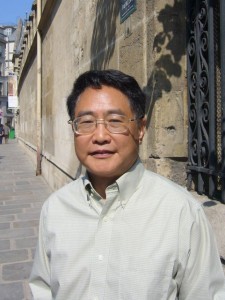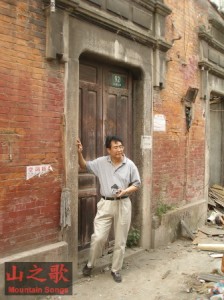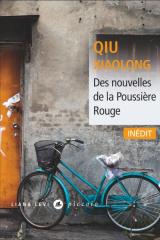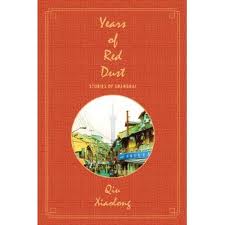 We have often spoken of Inspector Chen Cao, the hero of eight detective stories by the Sino-American writer Qiu Xiaolong.
We have often spoken of Inspector Chen Cao, the hero of eight detective stories by the Sino-American writer Qiu Xiaolong.
While in Paris before joining in Lyon the international festival “Quai du Polar” he could talk about the “Short stories of Red Dust” (Liana Levi, 2013) (1), the second collection which has just been published.
The City of Red Dust is part of the former French Concession and is a group of traditional houses of old Shanghai, the Shikumen.
Shikumen and Lilong, the old Shanghai:
These houses are built after 1900 with pink bricks and gray molded lintels; two floors and a small courtyard. They open on narrow streets, the Lilong, congested with electrical wires and drying laundry but also with people enjoying taking fresh air, drinking tea, bickering and talking.
This is where Qiu Xiaolong joined his friends after school and listened to the stories and rumors; stories which will be at the origine of some of his short stories.
The first volume was published in installments by the French “Le Monde” during the summer 2008, then in book form. With the second volume, a total of 42 years of the history of China after 1949 are discussed.
For each year, the short story is preceded by a newsletter, written on a blackboard at the entrance to the city. This great idea allows to provide the reader with specific details on the history of this year and in the official style of the Party propaganda at the time.
Inform in order to illustrate the short story, the small text that the author devotes to the events of that year.
 For Qiu Xiaolong, these short stories are his youth, his neighbourhood. He underlined that historical events, conversations, stories are an inspiration to a large part of Chinese literature. That is why he is quite happy that the first volume has been translated into Chinese and published in Hong Kong for the Chinese youth do not know their own history.
For Qiu Xiaolong, these short stories are his youth, his neighbourhood. He underlined that historical events, conversations, stories are an inspiration to a large part of Chinese literature. That is why he is quite happy that the first volume has been translated into Chinese and published in Hong Kong for the Chinese youth do not know their own history.
He most probably liked a good article by the writer Yan Lianke, whom he has already met, published a few days later in the New York Times: “The State in China organized amnesia.”
Short stories and poetry answer each other:
All these texts are independent but interconnected and some develop over many years. As the author writes on his blog:
“It is here that literature differs from history. Literature focuses on people, the tragedies or comedies of individual human being … What may serve merely as an inconsequential footnote for history is enough to seal the fate of a man or a woman in Red Dust Lane. “
The short stories will also be a source of inspiration for the poet Qiu Xiaolong. For him poetry is the important thing. It is for his thesis on the great Anglo-American poet TS Eliot that he left China for the United States in 1988 where he decided to stay after the massacre on Tiananmen Square.
He has published numerous translations of his favorite poets, which can be found in a site where they are accompanied by stunning photographs. He has also released in 2008 “Lines around China”, a collection of his poems in English.
Worlds on a blackboard:
The newsletter on the blackboard sets the scene but the themes of his short stories are of a great variety:
* historical events (the return of prisoners from Korea and the ties with Taiwan);
* events he has known (the man who carried the statue of Mao which earned him a lot of trouble was one of his primary school teachers).
 Often a lot of humour: the fortune that represents a collection of Chairman Mao badges or in another short story, how “the herb bread”, that was eaten during the famine that followed the Great Leap Forward, became fashionable in some “trendy” restaurants.
Often a lot of humour: the fortune that represents a collection of Chairman Mao badges or in another short story, how “the herb bread”, that was eaten during the famine that followed the Great Leap Forward, became fashionable in some “trendy” restaurants.
A set of three short stories “The same river” (1971-1989-2008) is particularly moving. Qiu Xiaolong said he had considered to write a separate novel and that these texts are partly autobiographical:
“It is because I met a girl studying English in a park in Shanghai that I decided also to learn it even if it was during the Cultural Revolution, but unlike in the short story, I never met her again “
These three short stories show us how individual destinies are shaped by historical events, by chance but also by dreams that must be preserved to avoid sinking in materialism as currently in China.
I note a certain ambiguity vis-à-vis the role of women. Qiu Xiaolong recognizes the work of liberation by Mao but stresses that the image of women during the Cultural Revolution was that of the “Woman of Steel” working, working as a man.
“I do not like to use women for propaganda, they should have the choice as under Mao, it was not politically correct to be a housewife. Today everything is different and young women will say: “I’d rather be unhappy in a BMW than happy but poor on a bike. ‘”
The criticism is not only historical. Although he insisted on the role of the Party, the interests of which are paramount and which did set quotas of guilty citizens to be discovered (“Dictionary of Chinese Proverbs”). Now everything is for sale, the ideology is of no interest to anybody and businessmen from Taiwan buy young mistresses in Shanghai (Concubine, 2007).
Literature should not give up:
 Qiu Xiaolong is very familiar with Chinese literature and we could talk about the authors he likes, Yu Hua, Yan Lianke or the Nobel prize for Mo Yan which had relatively little impact in the United States because only a few novels have been translated and insufficiently present in bookstores.
Qiu Xiaolong is very familiar with Chinese literature and we could talk about the authors he likes, Yu Hua, Yan Lianke or the Nobel prize for Mo Yan which had relatively little impact in the United States because only a few novels have been translated and insufficiently present in bookstores.
For him, criticism against writers in China is excessive:
“I’m lucky because I’m writing in the United States. Them, they have to survive and write inside the system and write good books … “
He regretted that some writers of Chinese descent, born in the United States, are merely surfing on the Chinese folklore while he is happy to speak to his readers about history, poetry, literature, and also (very often) about food …
Inspector Chen Cao meanwhile does not give up; the next book will be completed within six months. As we have already said, Qiu Xiaolong is very impressed with Bo Xilai.
It’s a real novel this case of this “neo-Maoist”governor and his wife sponsoring an assassination … Maybe because he met Bo Xilai when he was a student, perhaps because he notices here that truth is stranger than fiction. As he says:
“If the system does not change in the future, other Bo Xilai will come again .. “.
In this book, our Inspector Chen Cao is really in trouble and really threatened …
Bertrand Mialaret www.mychinesebooks.com
(1) These short stories were published in French in two volumes: “City of Red Dust”, translated from the American by Fanchita Gonzales Battle and ” Short stories from the Red Dust “, translated by Adelaide Pralon, to which one should add a small book”The good fortune of Mr. Ma “(for the years 1962 and 1982). These three books in paperback “Piccolo” with Liana Levi.
In English only the first volume has been published in september 2010 : “Years of Red Dust: Stories of Shanghai”; St Martin’s Press.





